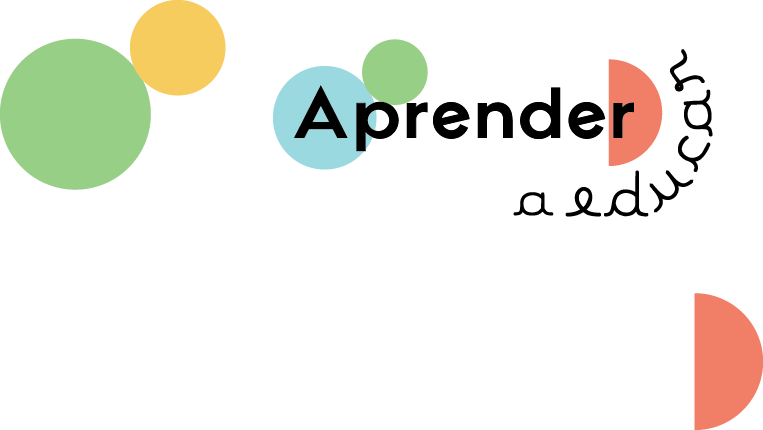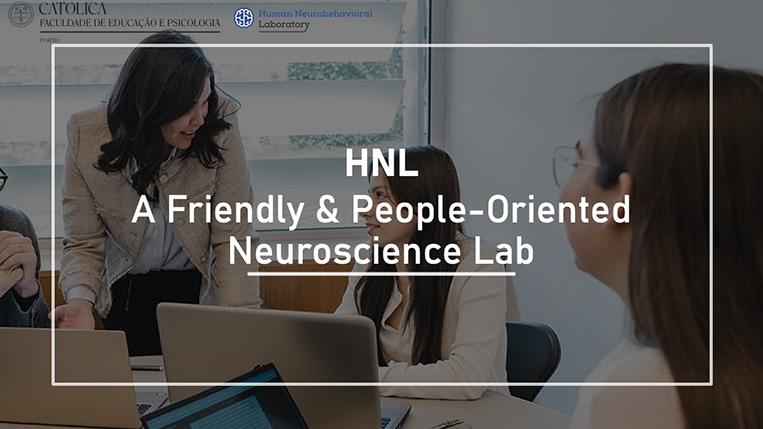
The HNL hosts more than 20 students from all undergraduate, master, and doctoral years, as well as post-doctoral researchers and internationally mobile students and researchers. At HNL, students have an excellent opportunity to experience a perfect start in research by entering a supervision program, which guides them towards an enriching experience at a professional and personal level. As for researchers, they have the opportunity to further their careers, develop or enhance various research skills to achieve greater autonomy, get involved in laboratory management tasks, and participate in the training of the future generation of Neuroscience researchers.
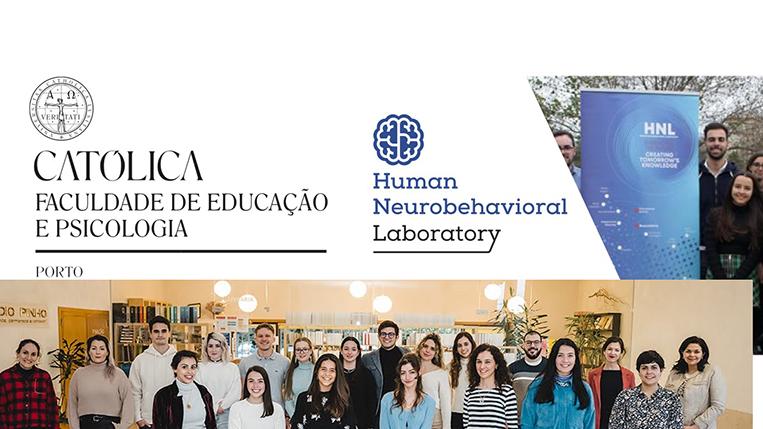
DIRECTOR
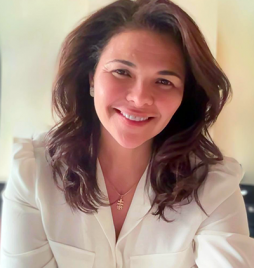
Patrícia Oliveira-Silva, Ph.D. (HNL Director)
@ posilva@ucp.pt | Consult CV: https://www.cienciavitae.pt/portal/C31C-A1F2-B041
I graduated in Biological Sciences with a specialization in Human Neurophysiology. My scientific career started at the end of 2014 when I completed my Ph.D. in Clinical Psychology at the University of Minho. Over the past decade, my career plan has focused on evolving a vibrant, inclusive, international, and interdisciplinary research ecosystem on human development within the HNL. This commitment has been centred on (i) carrying out impactful cross-disciplinary research focused on Applied Neuroscience Research, (ii) nurturing an environment that is both safe and stimulating for early-career researchers (ECR), and (iii) fostering international partnerships and collaborations in neuroscience research and education. This lab has been synonymous with my professional identity and a framework that has shaped my contributions to the field. Currently, I am the HNL director and the vice-dean of the Faculty of Education and Psychology (FEP), overseeing internationalization, research, and social responsibility.
SENIOR CONSULTANT
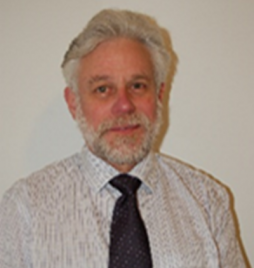
Ted Scharf
@ tscharf@ucp.pt | Consult CV: https://www.cienciavitae.pt/portal/C31C-A1F2-B041
Ted Scharf serves as the HNL consultant and has worked with us mainly on the Mental Health Neuroforce project. Ted is a distinguished Research Psychologist who recently retired after a commendable tenure at the National Institute for Occupational Safety and Health (NIOSH) in Cincinnati, Ohio, where he worked from 1992 to 2023. His expertise, derived from over three decades of dedicated occupational safety and health research, is invaluable to our team. His research has primarily focused on workload, stress, and the risks for injury in hazardous work environments, employing methods such as quasi-experimental research methodology, program evaluation methodology, and participatory action research. Ted is also well-versed in developing safety culture/climate and safety management systems, along with hazard recognition and creating interactive safety training for workers in hazardous environments. His insights and expertise are crucial to advancing our understanding and implementing effective mental health strategies in neuroforce work settings.
DOCTORAL RESEARCHERS
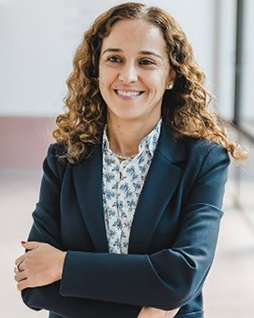
Patrícia Batista, Ph.D. (Post-Doctoral Researcher)
ontact: pbatista@ucp.pt | Consult CV: https://www.cienciavitae.pt/portal/CB17-644F-65AC
Patrícia Batista, Ph.D. in Biomedicine, Faculty of Health Sciences, University of Beira Interior. Master in Experimental Pathology by the Faculty of Medicine of the University of Coimbra and Master in Personal and Social Development by the University of Beira Interior. She is currently an integrated researcher at the HNL and at the Biotechnology and Fine Chemistry Centre (CBQF) and an invited assistant professor at the Education and Psychology Faculty of catholic university Portuguesa. She is responsible for interdisciplinary projects in the areas of Psychology-Neuroscience-Biotechnology. She has participated in projects funded by FCT and ANI, and is the author of several scientific publications, collaborator on three patents and reviewer in ten scientific journals of international scope. Co-supervisor of some master theses and final course projects. She participates in several juries of scientific evaluation and is an invited lecturer at the University of Beira Interior and University of Aveiro.
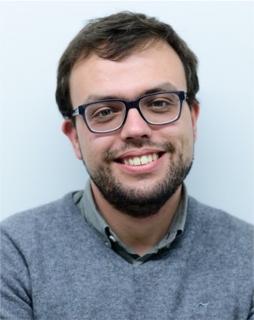
Pedro Miguel Rodrigues, Ph.D. (Assistant Professor)
Contact: pmrodrigues@ucp.pt | Consult CV: Science vitae - 7416-BD33-8299
Pedro M. Rodrigues has a degree, a master and a PhD in Biomedical Engineering. He is currently assistant professor at the School of Biotechnology - Portuguese Catholic University (ESB-UCP), integrated member of the Centre of Biotechnology and Fine Chemistry (CBQF-UCP) and collaborator of HNL-UCP. He is regent of Bioengineering/Biomedical courses in the area of Digital Signal Processing, Digital Electronics, Computer Programming and Machine Learning at ESB-UCP. His areas of interest and research focus on the automatic diagnosis of neurodegenerative, cardiac and speech diseases based on Artificial Intelligence. He has collaborated with HNL in the analysis and advanced processing of peripheral signals for the assessment of psychotic and cognitive deficit stages.
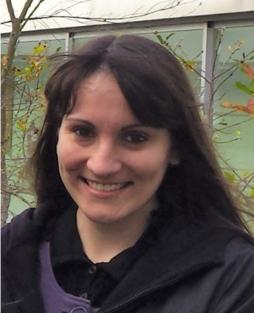
Diana Pereira, Ph.D. (Researcher)
Contact: drpereira@ucp.pt | Consult CV: Science ID - 1B14-4622-ACC3
Diana R. Pereira is currently a researcher at the Human Neurobehavioral Laboratory and an invited professor of Neuropsychology in the master’s in psychology of the Faculty of Education and Psychology, UCP - CRP. She has a PhD in Basic Psychology from the University of Minho, a master’s in clinical and Health Psychology from the Faculty of Psychology and Education Sciences of the University of Porto and a post-graduate degree in clinical intervention in Psychogerontology and Neuro-Psychogerontology. She has developed research in the area of memory using behavioral, neuropsychological and neuroimaging data. She has also collaborated in national and international projects in the area of neurosciences. Her scientific interests include the study of memory throughout development and in clinical conditions, as well as the study of interactions between memory, emotion and emotional regulation. She is also interested in investigating the impact of neuropsychological interventions (e.g., cognitive training; compensatory strategies) and other interventional approaches (e.g., learning a second language; mindfulness) on cognitive functioning and brain indicators. Also in this field, the identification of novel markers and assessment tools that are sensitive to health-related changes, as well as to changes associated with neuropsychological interventions are other focuses of interest.
DOCTORAL STUDENTS
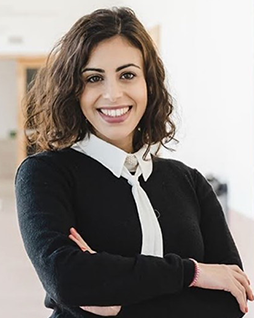
Ana Filipa Moreno, MSc.
Contact: amoreno@ucp.pt | Consult CV: Science ID - 9714-DCAA-64E0
Ana Moreno is a psychologist and currently a researcher at HNL in the Be@t project, focused on promoting sustainable behaviors. She is also a lecturer at FEP-UCP, teaching courses on basic psychological processes. She is currently completing her PhD in the International PhD Programme in Applied Psychology at FEP-UCP, NTU, and URL. This project aims to intersect psychology and neuroscience to better understand the effects of stress on mental health and how to promote socio-emotional skills and stress resilience in police officers. Throughout her academic and professional career, she has gained significant experience in various clinical settings, including palliative care and grief, psychiatric hospital settings—particularly neurodevelopmental disorders—and private clinical practice. This experience sparked a particular interest in neuropsychology, leading her to pursue a Dual Postgraduate Degree in Clinical Neuropsychology and Neuropsychological Assessment and Intervention. Since 2015, she has been part of the HNL research team, engaging in research, training, and community intervention. She has a particular interest in studying emotional intelligence-related topics, such as physiological synchronization, emotional regulation, and stress resilience, applied to various research lines (e.g., CAPSULE project—body image and emotional regulation, and DELTA project—caffeine's cognitive-affective impact).
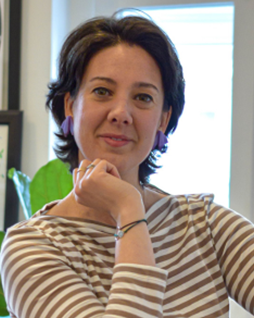
Elena Gasulla Tortajada, MSc.
Contact: s-etortajada@ucp.pt | Consult CV: Science ID - 7417-BFA9-78F7
Elena Gasulla holds a master's degree in Business Administration from the Universidad Politécnica de Valencia and is currently a PhD candidate in Marketing and Strategy at the Universidade da Beira Interior, funded by an FCT scholarship. She collaborates with HNL-UCP on research related to consumer behavior, sustainability, and the circular economy from a neuroscience perspective. At IPAM-Porto, she is responsible for courses on leadership and business planning and has also taught at the West Pomeranian Business School in Poland and UMaia. Before starting her PhD, Elena accumulated over 15 years of experience in management and finance, working for multinational companies such as Robert Bosch and Liebre Style. During this time, she led international teams in countries including Indonesia, the United States, Germany, and the Netherlands, among others. She currently resides in Portugal.
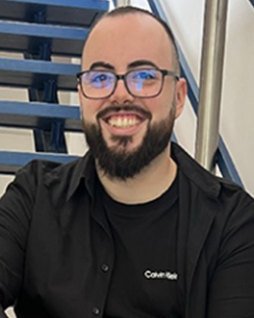
Miguel Ferreira
Contact: migmferreira@ucp.pt | Consult CV: Science ID - EB13-E0AA-6E0E
Miguel Ferreira is a psychologist and researcher in the field of Neurosciences, with a particular interest in understanding brain functioning—both cognitively and affectively—in populations with addictive behaviors or substance dependence (CADs). He also explores the effects of substances commonly consumed in daily life, such as coffee, probiotics, and energy drinks. He has been specializing in the use of new technologies, including neuroimaging and biomarkers, to optimize diagnosis and intervention for neurological patients with CADs. Additionally, he investigates how these tools can revolutionize cognitive and behavioral development in clinical populations.
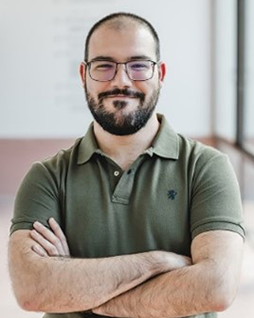
Pedro Ribeiro, MSc.
Contact: prribeiro@ucp.pt | Consult CV: Science ID - EE13-733D-72EC
Pedro Ribeiro, BEng Biomedical Engineering at Middlesex University, London, completed his MSc in Biomedical Engineering at the School of Biotechnology (UCP) supervised by Prof. Pedro Rodrigues and Prof. Patrícia Oliveira.Silva. He is interested in the theory and development of brain-computer interfaces, especially in terms of collecting data related to cognitive and motor activity in response to extracorporeal stimuli, as well as in software development in the languages of Matlab™, C++ and Python. His Ph.D. project is inserted in the HNL research line ‘Neural correlates of Consumer Behavior’ with the aim of designing and validating resources to analyze the neural correlates of decision making and other cognitive processes associated with the consumption.
RESEARCH ASSISTANTS
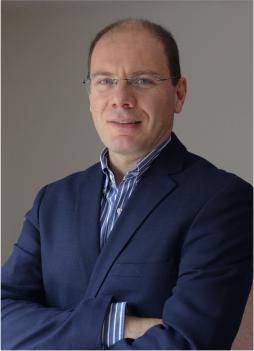
António Manuel Oliveira, PhD.
Contact: antoniomfoliveira@gmail.com | Consult CV: Science ID - CA1D-77B1-5ACD
António Oliveira was born in Porto. He completed his Bachelor's degree at ESMAE – IPP, earned a Master of Music diploma at The Hartt School, University of Hartford, Connecticut, United States of America, and completed his doctorate at HNL under the supervision of Prof. Patrícia Oliveira-Silva, Prof. Luísa Mota Ribeiro, and Prof. Gary McPherson (University of Sydney – Australia). He is a professional musician and has been working as a piano teacher at the Porto Music Conservatory since 2002. He has performed in solo recitals, chamber music, and with orchestras in Portugal, Spain, France, Germany, Finland, Canada, and the United States of America. He has recorded several CDs, commissioned, and premiered works by Portuguese composers, and has recorded for RTP and RDP Antena 2. As a member of the Human Neurobehavioral Laboratory, António is interested in "understanding the neurological foundations associated with music learning," "the effects of music on behavior and study," "understanding how the comprehension of neurological development and the use of psychological instruments can help identify the candidates for music conservatory admission exams who are in the best condition to begin the formal music learning process," to list just a few.
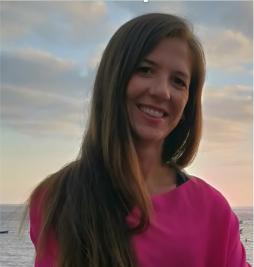
Lucia Penalba Sánchez, PhD.
Contact: lucia.penalba.sanchez@gmail.com | Consult CV: Science ID - 8E17-8256-0D35
Lucía Penalba Sánchez is a PhD student under the co-supervision of Prof. Patrícia Oliveira-Silva from HNL-UCP (Portugal), Prof. Ignacio Cifre from Universitat Ramon Llull (Spain) and Prof. Alexander Sumich from Nottingham Trent University (UK). She has a degree in Psychology, a master’s in educational psychology, a Master in Neuropsychology, and did her internship at the NeuroLab Cognitivo at the Universitat Oberta de Catalunya. Her PhD thesis focuses on the assessment of brain dynamics in Mild Cognitive Impairment and Alzheimer's disease using neuroimaging techniques. She recently conducted an rsfMRI study to explore brain connectivity in Alzheimer's disease patients using different methodological approaches. She has also co-authored two rsfMRI studies to explore interhemispheric functional connectivity in patients with neurodegenerative diseases and to determine relevant BOLD events. At HNL, Lucia is currently assistant researcher of the project "Healthy Soils for Healthy Food", focusing on health, nutrition, environment and neuroscience. Her main goal is to contribute to people's well-being which makes her available to collaborate in different health-related research projects through the use of dynamic functional connectivity, EEG and peripheral neurophysiological measurements.
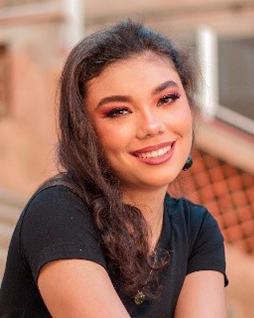
Ana Shubo, BsC
Graduated in Psychology from Centro Universitário Academia in Juiz de Fora, Minas Gerais, Brazil, and currently pursuing a postgraduate degree in Cognitive-Behavioral Therapy at PBE (Psicoterapias Baseadas em Evidências), Ana has always been curious about the human mind.
Her passion for the interface between neuropsychology and human anatomy sparked a deep interest in the work of the Human Neurobehavioral Laboratory, which excels in exploring the complex mechanisms of human behavior.
With a global perspective, she believes that cultural and academic exchange enriches learning and broadens horizons in psychology. Fascinated by cognitive functions and the processes that shape thought and behavior, she seeks to deepen her knowledge in neuropsychology and cognitive-behavioral approaches, integrating science and practice to make meaningful contributions to clinical psychology and health psychology.
UNDERGRAD INTERNS
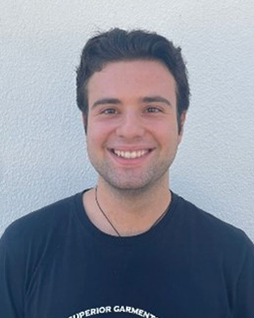
Pedro Silva
Contact: s-pedusilva@ucp.pt
Pedro is a first-year undergraduate student in Psychology. He has always been passionate about the field, and his curiosity led him to join HNL as soon as he learned about its existence. For him, Neuroscience provides the key to understanding human behavior, making it an essential foundation for any skilled psychologist. He is particularly interested in memory mechanisms, decision-making processes, and the impact of stress on the brain and behavior. Through his involvement with HNL, he aims to develop the skills and experience necessary to become a professional capable of understanding and guiding others.
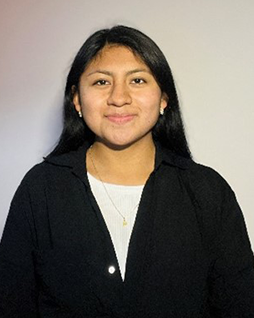
Melany Guamán
Contact: s-mguaman@ucp.pt
She is an international first-year Psychology student. Born in Ecuador, she had the opportunity to travel abroad from a young age, including living in New Zealand, where she achieved proficiency in English. She has sought to maximize her potential by experiencing different cultures, learning new languages, and ultimately deciding to move to Portugal to pursue a Psychology degree at Universidade Católica do Porto. She has long been interested in understanding how the brain processes information and how emotions relate to attachment, environmental changes, and other factors. Upon studying Neuroscience, she realized her passion for deeper research into the mind, using scientific methods and exploring aspects of human biology that influence neuroscience. In the future, she hopes to make meaningful contributions to neuroscience through research focused on human adaptation to new environments, the transition from adolescence to adulthood, and brain functioning in addiction-related processes.
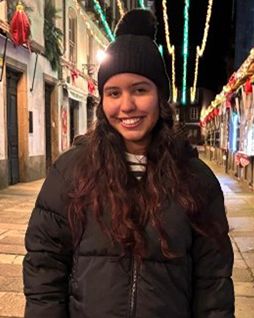
Lilyan lira
Contact: s-lillirsilva@ucp.pt
As a Psychology student, Lilyan is motivated to join the Human Neurobehavioral Laboratory (HNL) to explore the connection between neuroscience and human behavior. She sees this experience as a unique opportunity to contribute to innovative research, refine her scientific skills, and broaden her academic perspective in a global context.
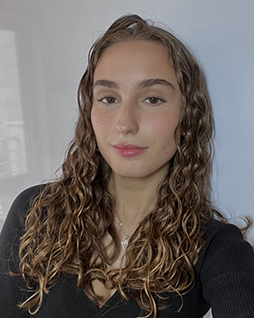
Maria de Bernardes Peixoto
Contact: s-mbpeixoto@ucp.pt
Maria is a Psychology undergraduate student at Universidade Católica do Porto. With neuroscience already in mind, it took just one semester for her interest in HNL to emerge. She has a deep fascination with the brain, particularly its role in human behavior and emotions. Volleyball has been a lifelong passion since childhood, and she is currently involved in the coaching staff of the Associação de Promoção da Juventude, where she also played for several years. Since the brain and sports go hand in hand, she sees no better way than to unite both fields.
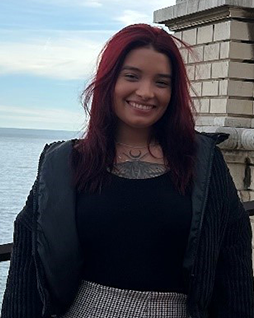
Laura Lacerda
Contact: s-lblacerda@ucp.pt
Currently in the first semester of Psychology, she previously studied Portuguese Language and Literature at the Universidade Federal de Goiás (Brazil) for three years, where she participated in a Pedagogical Residency program and gained experience as a teacher.
At HNL, she has found a place to deepen her knowledge in three areas that greatly interest her: psychology, language, and neuroscience.

Sara Patel
Contact: s-skpatel@ucp.pt
Sara Patel is a Psychology student at the Faculty of Education and Psychology (UCP) and a research assistant at HNL. In the field of neuroscience, she is particularly interested in the correlation between mental phenomena—both cognitive and affective—and human behavior. She sees HNL as a valuable opportunity to acquire and apply knowledge in a more practical setting. Additionally, she loves traveling and has a deep curiosity about the world around her.

Carlota Lobo
Contact: s-csmlobo@ucp.pt
Carlota Lobo is a first-year Psychology undergraduate student with a particular interest in Neuroscience, cognitive development, and mental health. Through HNL, she hopes to develop academic, professional, and socio-emotional skills that will be fundamental for her future practice in the field of neuroscience.
CONCLUDED MASTER STUDENTS
- Nicole Di GIÁCOMO - Sapienza University of Rome - Italy
- Julie Paula KOLBE - University of Klagenfurt - Austria
- Bianca Gomes da Silva
- Carolina Fernandes Pinheiro Antunes
- Cristian Mendonça Batista
- Henrique Gomes Santos
- Inês Dias Botelho Martins Pereira
- Jessyca Qiu
- Joana Maria Teixeira Pereira da Costa
- Maria Francisca Paiva Marinho da Silva
ONGOING MASTER STUDENTS
- Diana Alexandra Lourenço de Almeida
- Emanuel Pedro Rei de Vasconcelos
- David Emanuel Moreira de Saavedra
- Verónica Alexandra Secundino da Silva
- Rita Neves da Costa Monteiro Grilo
- Maria João Oliveira Azevedo
- Tomás Barbosa Ventura
- Carla Sofia Fernandes Rodrigues
ONGOING NATIONAL AND INTERNATIONAL INTERNSHIPS
- Ema Galic
University of Zagreb - Paola Huljic
University of Zagreb - Željana Ćelić
University of Zagreb
A SELECTION OF NATIONAL AND INTERNATIONAL INTERNS
- Flávia Fernandes
Universidade Federal de são Paulo - 2024: Nicole Di GIÁCOMO
Sapienza University of Rome - Italy - 2024: Julie Paula KOLBE
University of Klagenfurt - Austria - 2024: Aline GADELHA
Universidade Federal do Rio Grande do Norte – Brazil - 2024: Marco GAZZILO
Università Cattolica Sacro Cuore - Italy - 2023: Alvin SYNARONG
Fulbright scholarship from Princeton University – USA - 2023: Manuela LIMA
Universidade La Salle – Brazil - 2023: Aline GADELHA
Universidade Federal do Rio Grande do Norte – Brazil - 2023: Kinza GHAURI
Aga Khan University - Paquistan - 2023: Mahnoor ZAHID
Aga Khan University - Paquistan - 2023: Doreen TWINOMUGISHA
Aga Khan University - Uganda - 2023: Zehra Al KARIM
Aga Khan University - Paquistan - 2023: Ayesha SIDDIQUA
Aga Khan University - Paquistan - 2023: Ibrahim SHAH
Aga Khan University - Paquistan - 2022: Clarisa KUZMA
University of Primorska – Slovenia - 2022: Ogulcan ULU
Beykent University – Turkey - 2022: Raíssa Barros DOMINATO
Centro Universitário Academia, em Juiz de Fora - Minas Gerais, no Brasil - 2022: Maria de Fátima PENAS
Escola Superior de Saúde - Instituto Politécnico do Porto - Portugal - 2021: Elisa Di GREGORIO
Università Cattolica Sacro Cuore – Italy
CONCLUDED PH
2023: Lucia Penalba Sanchez
Title: “Temporal Dynamics in Alzheimer’s Disease: Integrated Knowledge from fMRI and EEG Studies”
International Ph.D. programme in “Applied Psychology”
2023: António Manuel Oliveira
Title: “Admission to Music Conservatoires: Assessment of the Predicting Power of Motivation and Parental Support”



